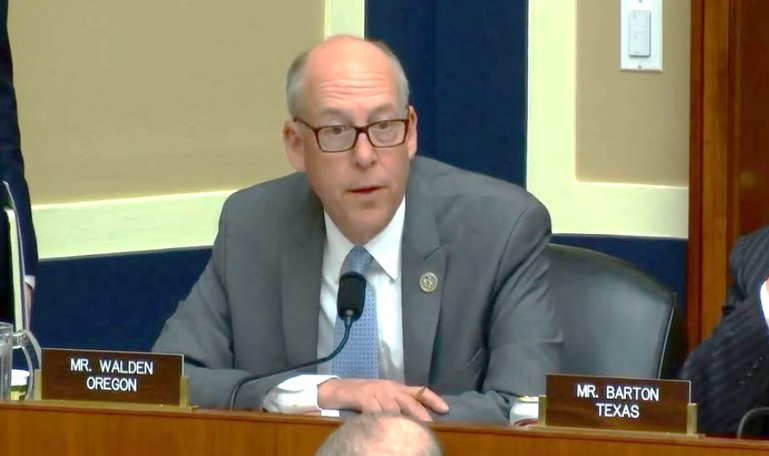Representative Greg Walden (R-Hood River) spoke in southern Oregon — where communities have faced unhealthy air quality from surrounding wildfires — to call for forest management reforms in the upcoming Farm Bill. Walden secured sweeping improvements to federal forest policy in the 2018 Farm Bill that passed the House in June and today urged for those needed changes to be included in the Senate passed version of the legislation. Walden sent a letter to the lawmakers who will negotiate the differences between the House and Senate versions of the 2018 Farm Bill, which reads:
“The West is burning. Lives have been tragically lost. Homes and other property have been destroyed. Smoke is choking our skies, leaving residents of southern Oregon and elsewhere with the worst air quality in the nation. It does not have to be this way. As you finalize the Farm Bill in 2018, I urge you to include the important forest management tools included in the House bill to make needed steps toward preventing these fires into the future.
“Years of poor management have left our federal forests overgrown and at risk of these unnaturally catastrophic fires. John Bailey, a professor at Oregon State University, testified last fall before the Energy and Commerce Committee that in some parts of eastern Oregon we have nearly 1,000 trees per acre on land that historically had 20 trees per acre. Across the West, these overstocked tree stands fuel the catastrophic fires we see each summer. Active management that thins out these forest stands and removes this fuel reduces the threat of fire, smoke, and other emissions. A recent study in California by The Nature Conservancy, Forest Service, and others found that fuels projects can reduce the size and intensity of fire up to 70 percent. These projects also reduce carbon emissions from the fire by up to 85 percent.
“Unfortunately, red tape and litigation from outside special interest groups hampers land managers’ ability to implement these needed forest management projects. The forestry title in the House passed Farm Bill builds on the forestry provisions we passed into law earlier this year and provides needed tools to reduce this red tape and streamline forest management projects to get more work done in the woods. When fire does strike, we ensure that the Forest Service and BLM can remove the burned, dead trees while they still have value and replant to restore our forests for the next generation. Just like what happens on private lands across Oregon.
“Communities across the West should not have to face the increasing threat of wildfire and choke on smoke each summer because of mismanagement of our public lands. We can do better. The forestry provisions in the House passed Farm Bill would help improve management and prevent fire in Oregon and across the West. I strongly urge you to include them in the final 2018 Farm Bill.”
Representative Walden continues to lead the effort in Congress to improve forest management to reduce the risk of wildfire and put people back to work in the woods.
Walden secured significant reforms to federal forest policy in the government funding measure that was signed into law in March, such as:
– Streamlined authorities for rapid implementation for wildfire resiliency and hazardous fuels reduction projects.
– Progress to fix fire borrowing, to help end the vicious cycle of depleting resources for fire prevention to pay for fire suppression, which increases the risk of catastrophic wildfires year after year.
– Expanded Healthy Forest Restoration Act authority for fuel and fire break projects.
– Gives the Forest Service and BLM the ability to offer stewardship contracts with a 20-year term.
– Expands “Good Neighbor Policy” to allow states to help with road maintenance, culverts, and other similar projects on Forest Service land.
The additional reforms Walden secured in the Farm Bill that passed the House include:
Streamlined and expedited authorities for projects, including:
– Critical response for insect and disease infestation, watershed protection, hazardous fuels reduction, and forest restoration projects;
– Cleaning up after a fire and requiring replanting of our forests;
– Early successional wildlife habitat development; and
Collaborative projects.
The House of Representative also agreed with Walden’s plan to protect a central Oregon community from wildfire, unanimously passing the Crooked River Ranch Wildfire Protection Act (H.R. 2075) earlier this month.
Crooked River Ranch is an unincorporated community of about 5,500 residents in Jefferson County. The lands adjacent to the community are managed by the Bureau of Land Management (BLM) and are classified as a Wilderness Study Area (WSA).
These lands are in the highest risk category for exposure to devastating wildfire due to overstocked juniper stands under the federally mandated and locally promulgated Jefferson County Community Wildfire Protection Plan. The current WSA classification prevents mechanical fire prevention activities within these overstocked juniper stands.
Walden’s bill would adjust the boundaries of the WSAs in order to better facilitate fire prevention activities on public lands and the adjacent private property.
The Crooked River Ranch Fire Protection Act will allow much-needed management of the excess fire fuels that surround Crooked River Ranch, reducing the danger of wildfire for the community who lives there.
Disclaimer: Articles featured on Oregon Report are the creation, responsibility and opinion of the authoring individual or organization which is featured at the top of every article.


